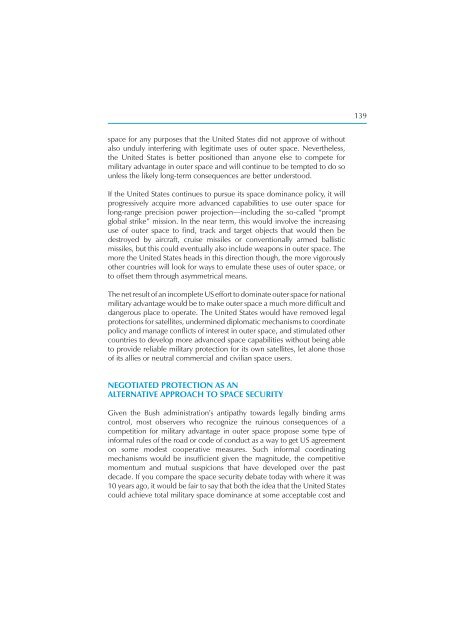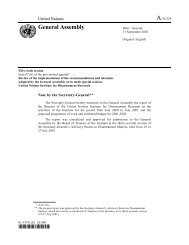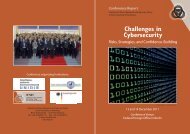Security in Space The Next Generation - UNIDIR
Security in Space The Next Generation - UNIDIR
Security in Space The Next Generation - UNIDIR
You also want an ePaper? Increase the reach of your titles
YUMPU automatically turns print PDFs into web optimized ePapers that Google loves.
space for any purposes that the United States did not approve of without<br />
also unduly <strong>in</strong>terfer<strong>in</strong>g with legitimate uses of outer space. Nevertheless,<br />
the United States is better positioned than anyone else to compete for<br />
military advantage <strong>in</strong> outer space and will cont<strong>in</strong>ue to be tempted to do so<br />
unless the likely long-term consequences are better understood.<br />
If the United States cont<strong>in</strong>ues to pursue its space dom<strong>in</strong>ance policy, it will<br />
progressively acquire more advanced capabilities to use outer space for<br />
long-range precision power projection—<strong>in</strong>clud<strong>in</strong>g the so-called “prompt<br />
global strike” mission. In the near term, this would <strong>in</strong>volve the <strong>in</strong>creas<strong>in</strong>g<br />
use of outer space to fi nd, track and target objects that would then be<br />
destroyed by aircraft, cruise missiles or conventionally armed ballistic<br />
missiles, but this could eventually also <strong>in</strong>clude weapons <strong>in</strong> outer space. <strong>The</strong><br />
more the United States heads <strong>in</strong> this direction though, the more vigorously<br />
other countries will look for ways to emulate these uses of outer space, or<br />
to offset them through asymmetrical means.<br />
<strong>The</strong> net result of an <strong>in</strong>complete US effort to dom<strong>in</strong>ate outer space for national<br />
military advantage would be to make outer space a much more diffi cult and<br />
dangerous place to operate. <strong>The</strong> United States would have removed legal<br />
protections for satellites, underm<strong>in</strong>ed diplomatic mechanisms to coord<strong>in</strong>ate<br />
policy and manage confl icts of <strong>in</strong>terest <strong>in</strong> outer space, and stimulated other<br />
countries to develop more advanced space capabilities without be<strong>in</strong>g able<br />
to provide reliable military protection for its own satellites, let alone those<br />
of its allies or neutral commercial and civilian space users.<br />
NEGOTIATED PROTECTION AS AN<br />
ALTERNATIVE APPROACH TO SPACE SECURITY<br />
Given the Bush adm<strong>in</strong>istration’s antipathy towards legally b<strong>in</strong>d<strong>in</strong>g arms<br />
control, most observers who recognize the ru<strong>in</strong>ous consequences of a<br />
competition for military advantage <strong>in</strong> outer space propose some type of<br />
<strong>in</strong>formal rules of the road or code of conduct as a way to get US agreement<br />
on some modest cooperative measures. Such <strong>in</strong>formal coord<strong>in</strong>at<strong>in</strong>g<br />
mechanisms would be <strong>in</strong>suffi cient given the magnitude, the competitive<br />
momentum and mutual suspicions that have developed over the past<br />
decade. If you compare the space security debate today with where it was<br />
10 years ago, it would be fair to say that both the idea that the United States<br />
could achieve total military space dom<strong>in</strong>ance at some acceptable cost and<br />
139








